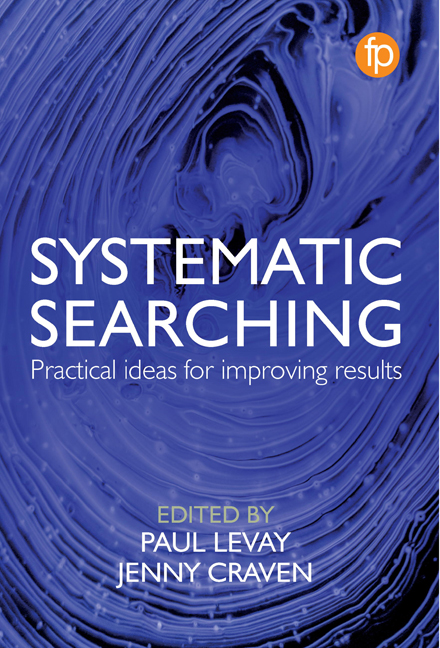Book contents
- Frontmatter
- Contents
- Figures, tables and case studies
- Contributors
- Acknowledgements
- Abbreviations
- Foreword
- 1 Introduction: where are we now?
- 2 Innovative approaches to systematic reviewing
- 3 Searching for broad-based topics
- 4 Choosing the right databases and search techniques
- 5 Gathering evidence from grey literature and unpublished data
- 6 Social media as a source of evidence
- 7 Text mining for information specialists
- 8 Using linked data for evidence synthesis
- 9 Evidence surveillance to keep up to date with new research
- 10 Training the next generation of information specialists
- 11 Collaborative working to improve searching
- 12 Communication for information specialists
- 13 The information specialist as an expert searcher
- 14 Conclusion: where do we go from here?
- Glossary
- Index
4 - Choosing the right databases and search techniques
Published online by Cambridge University Press: 08 June 2019
- Frontmatter
- Contents
- Figures, tables and case studies
- Contributors
- Acknowledgements
- Abbreviations
- Foreword
- 1 Introduction: where are we now?
- 2 Innovative approaches to systematic reviewing
- 3 Searching for broad-based topics
- 4 Choosing the right databases and search techniques
- 5 Gathering evidence from grey literature and unpublished data
- 6 Social media as a source of evidence
- 7 Text mining for information specialists
- 8 Using linked data for evidence synthesis
- 9 Evidence surveillance to keep up to date with new research
- 10 Training the next generation of information specialists
- 11 Collaborative working to improve searching
- 12 Communication for information specialists
- 13 The information specialist as an expert searcher
- 14 Conclusion: where do we go from here?
- Glossary
- Index
Summary
Introduction
In this chapter we will explore how to choose resources and techniques to provide the best results. Systematic searching is most often associated with systematic reviews in health care. However, systematic searching is also a key element of scoping reviews, systematic maps and realist reviews. The issues we describe here will certainly be useful when undertaking literature searching in any subject field including health, education and environment. By the end, you will have confidence in how to plan for your search, how to select the best sources to search and the best way to utilise those resources to maximise returns without increasing time pressures or workload.
The often cited rule for systematic review searching is that searches should be comprehensive and find all the available evidence relating to the research question. Chapters 2 and 3 have shown that a search may actually aim for representativeness rather than completeness. Focusing on the sensitivity of electronic database searches assumes that the best evidence is available on bibliographic databases. An important first step to take, therefore, is to ask which other techniques we might need to find the evidence, as well as deciding which databases we will search.
Advice on the most effective sources and best search techniques is readily available from librarians and other information specialists and it is particularly useful from those who have expertise in the relevant topic area. There are a number of studies comparing the content and functionality of different databases, comparing which method of searching finds the most relevant studies, or those examining different searches across databases. Despite this, the choice of resources to use in a search requires a combination of knowledge, intuition, availability and occasionally luck.
A rapidly changing world
Traditionally, systematic searching on health topics has focused on finding the best evidence, usually in the form of randomised controlled trials (RCTs), either published in journals or unpublished in registries of clinical trials. This model makes resource selection relatively straightforward. It is becoming increasingly common to see reviews take new approaches (see Chapter 2), include a variety of study types (for example, qualitative evidence) or synthesise reports and other documents often found in the grey literature (see Chapter 5).
- Type
- Chapter
- Information
- Systematic SearchingPractical ideas for improving results, pp. 73 - 94Publisher: FacetPrint publication year: 2018
- 1
- Cited by



